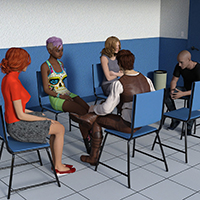Advances in research on attachment-related psychotherapy processes: seven teaching points for trainees and supervisors

Submitted: April 14, 2019
Accepted: October 26, 2019
Published: December 19, 2019
Accepted: October 26, 2019
Abstract Views: 2261
PDF: 1493
HTML: 63
HTML: 63
Publisher's note
All claims expressed in this article are solely those of the authors and do not necessarily represent those of their affiliated organizations, or those of the publisher, the editors and the reviewers. Any product that may be evaluated in this article or claim that may be made by its manufacturer is not guaranteed or endorsed by the publisher.
All claims expressed in this article are solely those of the authors and do not necessarily represent those of their affiliated organizations, or those of the publisher, the editors and the reviewers. Any product that may be evaluated in this article or claim that may be made by its manufacturer is not guaranteed or endorsed by the publisher.
Similar Articles
- Christopher B. Harte, Raymond C. Hawkins II, Impact of personality disorder comorbidity on cognitive-behavioral therapy outcome for mood and anxiety disorders: results from a university training clinic , Research in Psychotherapy: Psychopathology, Process and Outcome: Vol. 19 No. 2 (2016)
- Cheri L. Marmarosh, Steven Sandage, Nathaniel Wade, Laura E. Captari, Sarah Crabtree, New horizons in group psychotherapy research and practice from third wave positive psychology: a practice-friendly review , Research in Psychotherapy: Psychopathology, Process and Outcome: Vol. 25 No. 3 (2022): SPECIAL ISSUE: "Group psychotherapy: between settled benchmarks and new horizons"
- Gianluca Cruciani, Marianna Liotti, Vittorio Lingiardi, Motivations to become psychotherapists: beyond the concept of the wounded healer , Research in Psychotherapy: Psychopathology, Process and Outcome: Vol. 27 No. 2 (2024)
- John S. Auerbach, The contributions of Sidney J. Blatt: a personal and intellectual biography , Research in Psychotherapy: Psychopathology, Process and Outcome: Vol. 20 No. 1 (2017)
- Ester D'Onofrio, Cecilia Serena Pace, Donatella Cavanna, Qualitative research in adolescent psychotherapy: attachment and reflective functioning as psychotherapy’s outcomes of an adolescent with anorexia nervosa , Research in Psychotherapy: Psychopathology, Process and Outcome: Vol. 18 No. 2 (2015): Special issue on Qualitative and Quantitative Research in Child and Adolescent Psychotherapy: part 1
- CV Vijayapriya, Rameshbabu Tamarana, Effectiveness of dialectical behavior therapy as a transdiagnostic treatment for improving cognitive functions: a systematic review , Research in Psychotherapy: Psychopathology, Process and Outcome: Vol. 26 No. 2 (2023)
- Monica Accordini, Scott Browning, Marialuisa Gennari, Kevin McCarthy, Davide Margola, Till the ocean do us part: Italian and American therapists representations of stepfamilies in treatment , Research in Psychotherapy: Psychopathology, Process and Outcome: Vol. 20 No. 3 (2017)
- Felix Brauner, Peter Fonagy, Chloe Campbell, Julia Griem, Timo Storck, Tobias Nolte, “Trust me, do not trust anyone”: how epistemic mistrust and credulity are associated with conspiracy mentality , Research in Psychotherapy: Psychopathology, Process and Outcome: Vol. 26 No. 3 (2023)
- Sara Salzano, Isa Zappullo, Vincenzo Paolo Senese, Massimiliano Conson, Carmela Finelli, Mario Mikulincer, Phillip R. Shaver, Validation and psychometric properties of the Italian version of the Power Behavioural System Scale , Research in Psychotherapy: Psychopathology, Process and Outcome: Vol. 26 No. 1 (2023)
- Jule Bauckhage, Christian Sell, When and for whom do psychodynamic therapists use guided imagery? Explicating practitioners’ tacit knowledge , Research in Psychotherapy: Psychopathology, Process and Outcome: Vol. 24 No. 3 (2021)
<< < 1 2 3 4 5 6 7 8 9 10 > >>
You may also start an advanced similarity search for this article.

 https://doi.org/10.4081/ripppo.2019.405
https://doi.org/10.4081/ripppo.2019.405




